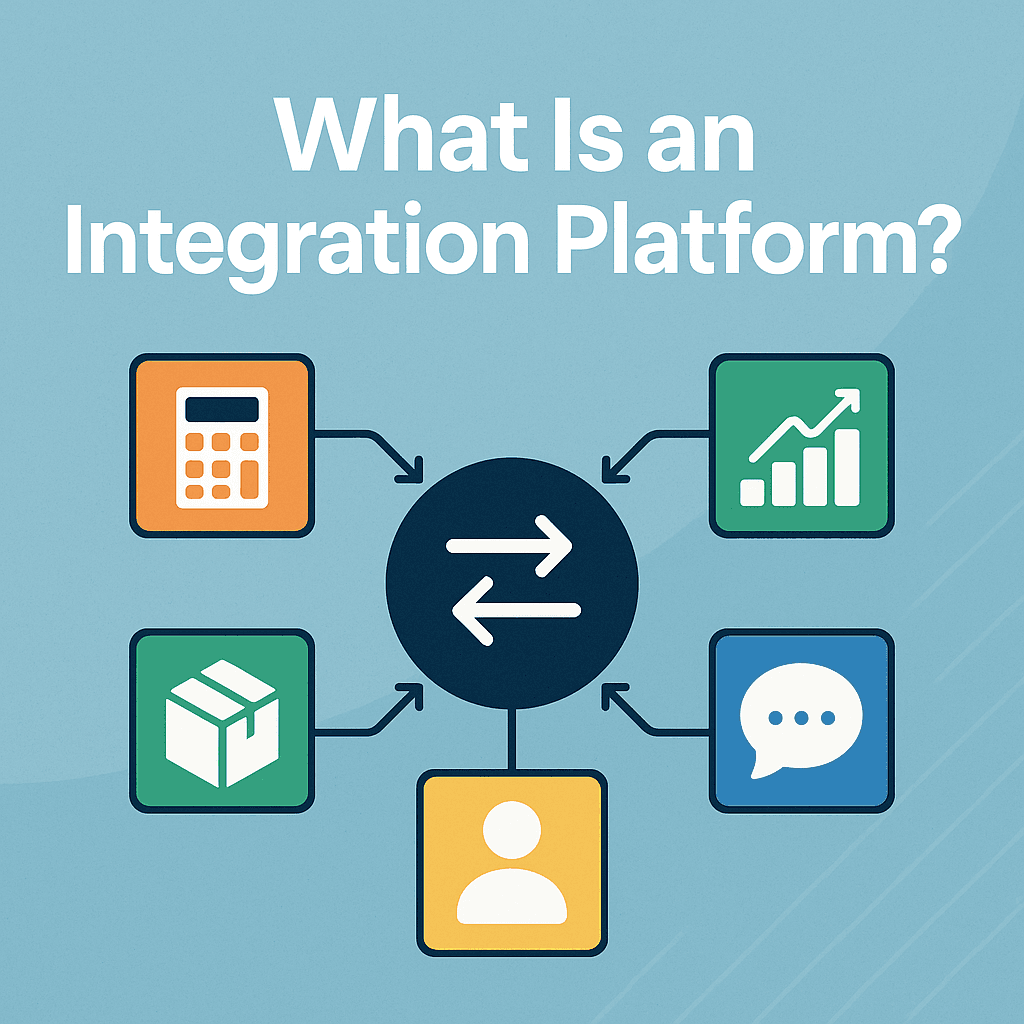An integration platform connects data and systems across your business. Learn how Orderful helps supply chain companies integrate, scale, and automate.
Businesses today rely on a multitude of systems to manage finance, sales, supply chains, and customer relationships. Every platform generates critical data, but when they can’t effectively communicate with each other, operations slow down and mistakes creep in. An integration platform solves that problem by connecting different applications, converting data into the right formats, and keeping on the same page with up-to-date information.
A robust integration platform means fewer data silos, less manual entry, and smoother business processes. They've become essential for streamlining operations and supporting digital transformation. But not every platform is designed to fit the same needs. Some focus on simple app-to-app connections, while others are built for the complex realities of supply chains.
From ERP and CRM software to EDI systems, this article will dive into integration platforms, explore the various options available to connect all your business systems, and discuss why they're critical for operational efficiency in a tech-driven supply chain environment.
Integration Platform Definition
An integration platform is software that connects different applications and data sources so they can share information in real time. Instead of each system operating in isolation, an integration platform acts as a hub that manages the transfer of data between finance, operations, sales, supply chain, and customer systems.
Unlike custom middleware or a single API connection, an integration platform provides a centralized way to manage integration flows across multiple systems. It can transform data formats, map fields between applications, and monitor transactions to make sure information reaches its destination without errors.
In practice, this means organizations can exchange data between enterprise applications and other current systems without building fragile point-to-point connections. The result is a more flexible IT ecosystem and a foundation for seamless integration across business operations.
Types of Integration Platforms
Not all integration solutions work the same way. Businesses can choose from several types of integration platforms, each with levels of complexity and each designed for different needs. The right choice depends on whether you’re connecting cloud apps, handling ERP or EDI data, or trying to modernize an entire supply chain.
Types of Integration Platforms
Type | Focus | Pros | Cons |
|---|---|---|---|
iPaaS (Integration Platform as a Service) | Cloud SaaS app-to-app connections | Flexible, supports many SaaS apps | Complex pricing, not built for B2B or supply chain |
EDI Platforms | Standardized document exchange for trading partners | Retailer and ERP compliance | Legacy VAN-based platforms are slow and costly |
API-First Integration Platforms | Real-time connectivity for modern supply chains | Fast, scalable, cloud-native | Newer category, vendors vary in maturity |
Web EDI | Portal-based integrations for SMB suppliers | Easy onboarding, low barrier to entry | Manual processes, limited automation |
These categories often overlap. For example, an enterprise integration platform may combine iPaaS-style flexibility with B2B and EDI capabilities. What matters most is whether the platform supports your specific business processes and trading partner requirements.
Key Features of an Integration Platform
A modern integration platform connects applications and includes features that help organizations streamline operations, protect sensitive data, and reduce manual workflows. While every vendor offers its own mix of tools, the most effective solutions share these vital capabilities:
Connectivity across various systems: Connects ERP, CRM, supply chain, and other business systems, such as QuickBooks, to share data between different platforms and software types.
Data translation and mapping: Transforms data formats and applies transformation rules so one application can understand information from another.
Monitoring and error handling: Tracks integration flows, flags failed transactions, and alerts business users so they can resolve issues quickly.
Scalability: Supports growth by handling complex integrations, larger transaction volumes, and new integration points without major rework.
Security: Uses access controls and encryption to protect sensitive data as it moves between applications and business units.
Process automation: Replaces manual data entry with automated workflows that keep information accurate and up to date.
Together, these features enable organizations to integrate applications seamlessly, eliminate data silos, and maintain a comprehensive view of business operations.
Challenges with Traditional Integration Platforms
Traditional integration platforms can connect systems, but they often come with limitations that make them difficult to sustain in a modern business environment. Companies exploring some of the most well-known iPaaS solutions frequently encounter the same roadblocks:
High costs: Licensing fees, per-transaction charges, and hidden costs such as VAN fees can make these solutions expensive to maintain.
Steep learning curve: Complex integrations require significant IT resources and expertise, leaving business users dependent on specialists instead of being able to manage integrations themselves.
Slow onboarding: Bringing on a new trading partner or connecting to a new application can take weeks or months, which delays revenue.
Rigid architectures: Point-to-point integrations and on-premises applications create bottlenecks that are hard to scale or adapt as business needs change.
Ongoing manual processes: Even with automation capabilities, many legacy solutions still rely on manual data entry and error handling.
These hurdles often result in slower projects, a higher risk of data errors, and frustrated business units. Companies operating in dynamic supply chains need a more modern approach to connecting their applications and data systems.
Why Supply Chain Companies Need a Specialized Integration Platform
Generic integration software can connect SaaS apps or automate simple tasks, but supply chain companies face challenges that go beyond app-to-app connections. Retailers, distributors, and grocers expect suppliers to exchange standardized documents, integrate with ERP systems, and deliver real-time data across multiple partners. Meeting those requirements calls for a platform built with supply chain complexity in mind.
EDI and API Together
Supply chains run on electronic data interchange (EDI), but modern business operations also demand real-time API connections. A specialized integration platform supports both EDI and API, enabling businesses to exchange structured EDI documents with trading partners while also integrating APIs for faster updates. This hybrid approach allows companies to transform data, integrate applications, and keep information flowing seamlessly across various systems.
Faster Partner Onboarding
Traditional iPaaS tools can take weeks or months to set up new connections. In supply chains, that delay can mean missed orders and lost revenue. A supply-chain-focused integration platform accelerates onboarding by using prebuilt mappings and reusable integration flows, helping businesses connect to new trading partners in days instead of months.
ERP and Supply Chain Integration
Enterprise resource planning (ERP) systems sit at the heart of most supply chains, managing inventory, orders, and financials. A specialized platform makes it easier to integrate ERP with external systems, reducing manual processes and ensuring up-to-date information moves between business units. This reduces costly errors and helps organizations streamline operations.
Operational Efficiency and Compliance
Supply chain companies can’t afford disruptions caused by missed requirements or data errors. A specialized integration platform simplifies compliance with retailer standards while keeping sensitive data secure. Enforcing access controls, applying consistent transformation rules, and automating routine integration tasks reduces the risk of failed transactions. This creates smoother business operations, fewer manual processes, and a stronger foundation for digital transformation.
Orderful: A Modern Integration Platform for Supply Chains
Orderful is built specifically for supply chain companies that need to connect quickly with retailers, distributors, and other links in their supply chain. Unlike general iPaaS vendors, Orderful provides an API-first, cloud-native integration platform that eliminates the delays and costs that come with many traditional solutions.
A Single Connection
With Orderful, companies connect once to the network and gain access to thousands of trading partners. Our platform offers prebuilt mappings, automated testing, and reusable integration flows that allow suppliers to onboard quickly. Many connections are completed in less than nine days.
Transparent Pricing
Many integration vendors charge by transaction volume or tack on hidden fees, which makes costs unpredictable and hard to budget. Orderful uses a flat, transparent pricing model so companies always know what they’ll pay each month. This removes the uncertainty of variable bills and allows businesses to scale their supply chain integrations without worrying about unexpected expenses.
Ease of Use and Scalability
For companies that previously struggled with legacy providers, Orderful offers an easier alternative to costly EDI outsourcing and outdated providers. Businesses that start with Orderful web EDI can later grow into full API-driven integrations on the same modern platform without missing a beat.
By combining EDI, API, and supply chain expertise into a single solution, Orderful helps businesses streamline operations, reduce manual processes, and stay compliant with partner requirements — all without the heavy IT investment required by legacy integration tools.
Choose the Right Integration Platform for Your Business
An integration platform should do more than just connect applications. It needs to reduce manual work, protect sensitive data, and give business leaders confidence that their systems are always in sync. Generic iPaaS tools may work for simple SaaS apps, but companies that rely on ERPs, EDI, and supply chain partners need something more specialized.
Orderful offers the modern alternative. By combining API-first technology with full EDI capabilities, the platform helps organizations eliminate data silos, accelerate onboarding, and streamline operations across multiple systems. It’s the integration solution built to handle the realities of today’s supply chains. Contact an EDI expert to discuss your integration needs or book a demo and see Orderful in action.
FAQ Section
What is an integration platform?
An integration platform is software that connects different business systems so they can share data in real time. It helps eliminate silos, automate processes, and maintain consistency across finance, operations, and supply chain systems.
What are the main types of integration platforms?
The most common types include iPaaS, EDI platforms, API-first platforms, and web EDI solutions. Each serves different needs, from simple SaaS connections to complex supply chain integrations.
What’s the difference between iPaaS and an integration platform?
iPaaS tools focus on connecting cloud-based apps, while a full integration platform can handle more complex data exchanges such as EDI and ERP integration across supply chains.
Can an integration platform replace EDI?
Not entirely. The best modern platforms combine both EDI and API capabilities, allowing companies to exchange standardized documents while enabling real-time data sharing.
Why is Orderful the best integration platform for supply chains?
Orderful is built for the complexity of supply chains. Its API-first, cloud-native platform connects companies to thousands of trading partners quickly, with transparent pricing and rapid onboarding.
- 01Integration Platform Definition
- 02Types of Integration Platforms
- 03Key Features of an Integration Platform
- 04Challenges with Traditional Integration Platforms
- 05Why Supply Chain Companies Need a Specialized Integration Platform
- 06Orderful: A Modern Integration Platform for Supply Chains
- 07Choose the Right Integration Platform for Your Business
- 08FAQ Section

